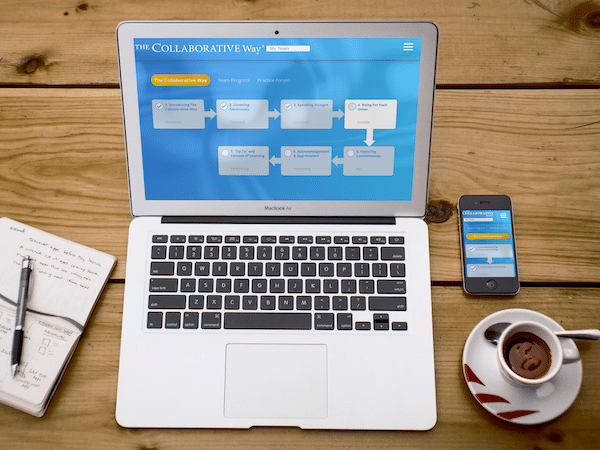A New Move to Make When Someone Won’t Listen
Hi, I’m Jason Fickett, co-author of The Collaborative Way® books and a consultant on our Collaborative Way team, and I have a story I’d like to share with you today about an Insight I had while working with my dad on a Collaborative Way app that we recently finished. And this insight brought me back to one of the core operating principles of Listening Generously, which is: If you’re not being heard, there’s something you’re not hearing. And the idea here is that, usually, when we feel like we’re not being heard, our first reaction is to try harder, to explain it more, really get the other person to understand what we’re trying to say. A lot of times, we end up getting louder or maybe even getting frustrated. And there’s another move you can make here, which is often a more powerful move. And that is to check and see if there’s something the other person needs to feel heard about before they can listen to you. Maybe they have a concern. Maybe they have their own idea they’re trying to express, and they need to feel heard before they even can listen to you.
The Frustration of not Feeling Heard
So,to come back to my story with my dad, when we were working on the app, sometimes things went really smoothly. He would offer up an idea, or I would offer up an idea, and we would agree on it. We would be able to collaborate on it, make progress, and it was great. But sometimes things didn’t go so smoothly. Sometimes my dad would offer up an idea, and I would disagree about it–disagree with the direction for the app or the content for a video–and then sometimes those conversations got heated, and sometimes those conversations ended up in a breakdown. And this ended up happening often enough that we decided we needed to stop and look and see: what’s going on in these conversations? What’s leading to these breakdowns? And when we did that, we found that there was a dynamic at work between us, and the dynamic was that when my dad would offer up an idea, and I would disagree with it, he felt like I was being dismissive of his idea–that I wasn’t even really considering his idea. And I felt like he just wasn’t listening to what I was trying to say. I was trying to be as careful as I could, trying to really explain why I didn’t think his idea was going to work, but I just felt like I couldn’t get him to listen. And so we saw that when he felt like he was being dismissed, and I felt like I wasn’t being heard, it led to frustration that boiled out for both of us and ended up in a breakdown.
If You’re Not Being Heard, There’s Something You’re Not Hearing
So, after we saw this, it brought us back to this operating principle of Listening Generously: if you’re not being heard, there’s something you’re not hearing. And I could see that I didn’t feel like I was being heard, but what was behind it was that I wasn’t hearing what he was saying. I wasn’t hearing that he felt dismissed about the idea he was offering up. So, after we had that insight, I made a much more conscious effort that when he offered up an idea that I disagreed with, that I would make sure to first practice Listening Generously, practice the skills of Listening Generously, including replicate and recreate, and to make sure that he felt heard about his idea before I offered up my idea of why I didn’t think that was going to work–if that was still the case after really Listening Generously. And so it led to us having more productive conversations when we got to that place where we were in disagreement, and also a much more pleasant way of working together through those disagreements.
More Productive Conversations and Better Outcomes
So, I encourage you, the next time you find yourself in a conversation where you just feel like you can’t get heard by the other person no matter what you do, no matter how careful or how loud you get, you just can’t get the other person to listen–I encourage you to consider this operating principle: if you’re not being heard, there’s something you’re not hearing. And to try to take another move, try and check and see: is there something the other person needs to be heard about–maybe they have a concern about something, they have their own idea they feel like you’re not hearing. Make sure they feel heard, and then try and offer up what you’re trying to get heard about, what you’re trying to say. I think it’ll lead to much more productive conversations and a much better outcome.


I really appreciate this reframe about moving back into generous listening when not feeling heard. I’m curious how you and your father created a space to name the dynamic of dismissiveness. Did that awareness come easily through conversation or did it take some solo self-reflection?
I ask because when collaborating across power dynamics, it can be challenging to come to a consensus about the underlying social forces, like gender roles or racial stereotypes at play.
It definitely required some solo self-reflection on my dad’s part. On his own, he looked to see what was going on when he was getting frustrated in our conversations, and he found that a lot of it was coming from this feeling of being dismissed. It didn’t really require us to come to a consensus about it. It was a case of him sharing with me what was causing his frustration in our conversation. And once he had the insight, it helped us find a way to be more effective the next time we dealt with a similar situation.